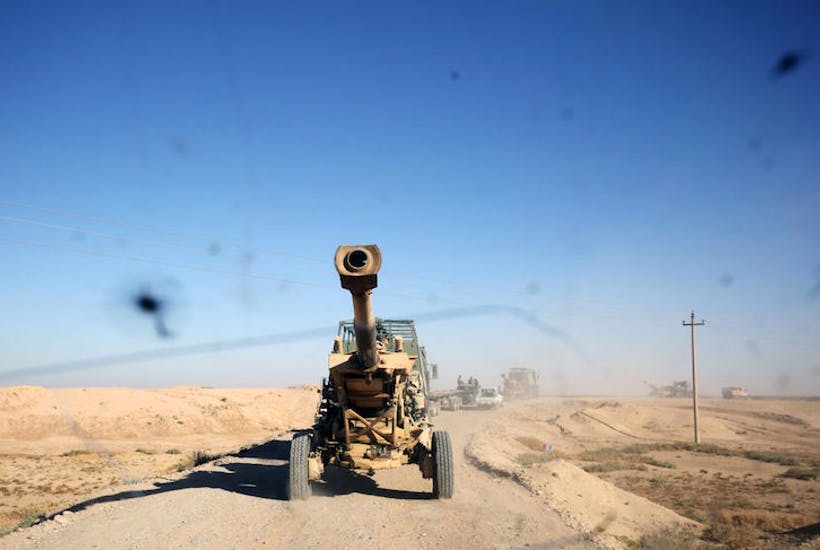The routing of Isis in northern Iraq ought to be a time of international celebration, but as ever in the Middle East, there is no such thing as a straightforward victory. No sooner had Isis been driven away — though not quite vanquished — than the next great struggle commenced, this time between the Iraqi government and the Kurdish forces who for the past three years have been holding back Isis from the city of Kirkuk and its surrounding oilfields.
This week, Iraqi forces stormed into Kirkuk and raised the country’s official flag, removing the Kurdish flag which was raised there in 2014. While Kirkuk lies outside the semi-autonomous Kurdistan region agreed in 2005 to offer the Kurds some kind of homeland, it has for the past three years operated as part of that region, not least because it has been effectively cut off from Baghdad. The new battle for Kirkuk has become a proxy for the wider campaign for Kurdish independence, which culminated in an unofficial referendum last month where 93 per cent supported secession.
This was a strategic mistake. It antagonised Baghdad, which then grounded all international flights to Kurdistan. To complicate matters further, Baghdad appears to have enlisted the help of the Iranian Islamic Revolutionary Guard Corps, whose leader General Qassem Suleimani was in Kirkuk this week. For Iran, the battle for Kirkuk is a proxy for something different: a general power struggle where it hopes to subsume Iraq into its axis of Shia influence — and deny Israel the hope of an alliance with a democratic Kurdistan.
Few would envy foreign office ministers and officials who must venture into this region, so fraught with religious, ethnic and political rivalries. Even Kurdistan’s regional government is a DUP-Sinn Fein-style stitch-up between the Kurdistan Democratic Party (KDP) and the Patriotic Union of Kurdistan (PUK). To make matters worse, there is the involvement in Kirkuk of the Kurdistan Workers’ Party (PKK), the guerrilla group which for decades has been fighting for an autonomous Kurdish state within Turkey.
Traditionally, Britain has been opposed to Kurdish claims of independence — as have most members of the international community. It’s hard to see why countries seeking a two-state solution to the Palestinian question are opposed to one for Kurdistan. The UN has backed an independent Palestinian state, but the Kurds’ claim to autonomy is rejected by almost everyone — in spite of their having demonstrated that they can run and defend their country.
The economic success and stability of Kurdistan under the de facto independence of the last ten years has been extraordinary. The Kurds have created a pipeline into Turkey through which to export oil. Turkey has not shut it off in spite of its own anger at the referendum — it needs the money. Erbil, the capital of the Kurdistan region in Iraq, has developed into a bustling, modern city with Jaguar dealerships and high-rise business blocks. But Iraq does not want to lose one of its most prosperous regions, and the Kurdish referendum was seen as a direct challenge to the authority of Haider al-Abadi, who faces elections in the spring. It was a card of desperation, played because Britain, the United States and other erstwhile allies of the Kurds seemed to have lost interest.
Britain has generally supported the integrity of Iraq, a country we created in the 1920s in defiance of religious and ethnic boundaries. Kurdish independence, we argued, would needlessly antagonise Turkey; we also hoped that a democratic Iraq would act as a counterbalance to Iran. But Iraq has remained a violent, disunited country. It collapsed under the challenge of Isis. Baghdad now appears to have turned to Iran for help in enforcing its own internal borders, in driving Kurdish forces from Kirkuk.
There was a time when Britain could have helped steer the Kurds away from the referendum, and conflict with Baghdad, by offering support for it, protecting its auto-nomy within a federalist structure. But having helped the Kurds to drive out Isis, we lost interest. We could have opposed attempts to undermine Kurdistan’s auto-nomy, while reminding the Kurdistan government that the route to independence would not be found by a protest referendum. But instead we walked away — to the dismay of our Kurdish allies, and to the delight of Iran.
Britain’s reputation and influence in Kurdistan had been high since John Major established the no-fly zone which prevented a repeat of the atrocity waged against the Kurds in 1988, when Saddam launched a chemical weapons attack on Halabja. Westminster’s silence over Kurdistan and Kirkuk may be a symptom of how the long grind over Brexit has come to crowd out all other foreign concerns. But Britain has anyway been tiptoeing away from the centre stage of world affairs. Our policy these days is to keep quiet and leave our former allies to fight their own battles, as the Kurds are now finding out.






Comments